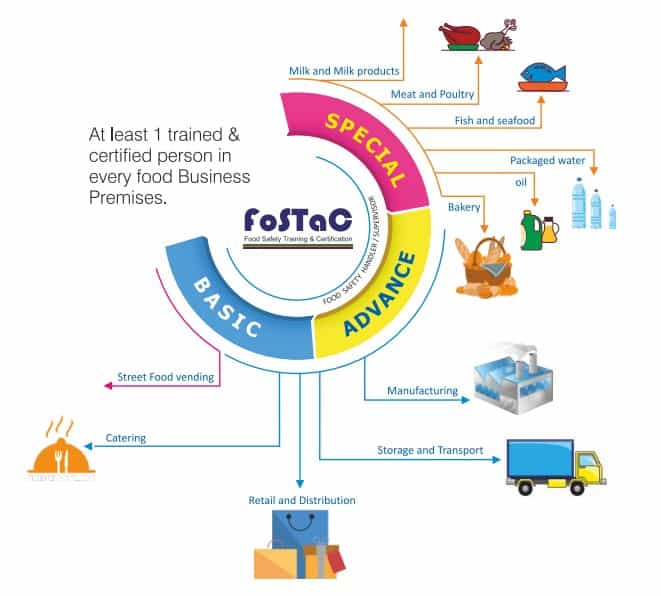Ignorance is not always bliss, especially if it is your service provider. If you are relying more and more on ordering your food, ready to eat, then you should really be concerned. According to a report released by WHO, the foodborne diseases in the WHO South-East Asia Region includes more than 150 million illness and 175,000 deaths. The Integrated Disease Surveillance Programme (IDSP) network was launched in India in the year 2004. The data they have accumulated from 2011 to 2015 shows that foodborne outbreaks together with acute diarrhoeal diseases constitute nearly half of the total reported outbreaks under IDSP for the period of 2011 to 2016.
Wondering why these numbers are surprisingly so high? During the analysis of the audits we had done for over 100 outlets, we found that 6 out of 10 establishments had no training program. Education is the key and food poisoning, or any foodborne illness can be avoided with good food safety practices. Proper food safety training is necessary for employees who handle food, be it in the catering industry or the manufacturing industry. Training them on personal hygiene, appropriate holding temperatures and suitable cooling procedures make a massive difference.
The food safety and hygiene trainings are not just limited to the food handlers, each and every employee who works in the facility should be aware of the safety and hygiene to be maintained there. For this, the managements have to make sure that all the employees have the basic competency in food safety and hygiene management. In pursuance of Section 16 (3) (h) of the Food Safety and Standards Act 2006, FSSAI had initiated the Food Safety Training & Certification (FoSTaC) program in July 2017. FSSAI recommends that all licensed food businesses must have at least one trained and certified Food Safety Supervisor under FoSTaC for every 25 food handlers on each premise. This is to ensure that there is at least one supervisor who is competent enough to train and develop a good food handling/safety culture in the food business. Courses have been developed by domain experts and visited by the expert committee of FSSAI. Training manuals are based on general hygiene or manufacturing practices as detailed under schedule 4 of FSS Regulation courses have been divided into the following 3 levels.
- Basic level certification is meant for food business. Duration of each course is of 4 hours. Courses are:
- Street Food Vending,
- Catering,
- Manufacturing,
- Storage & Transport
- Retail & Distribution
- Advanced Level courses and certification are for State & Central Licensed food business. Duration of each course is 8 hours. Courses are: –
- Catering,
- Manufacturing,
- Storage & Transport,
- Retail & Distribution
- Special courses have been developed for high-risk food business or the food businesses which require special attention. Duration of special course is 8-12 hours. Spread over 1-2 days. Courses are:
- Milk & Milk Products,
- Meat & Poultry,
- Fish & Sea Food,
- Packaged Water,
- Bakery (Level 1),
- Bakery (Level 2),
- Edible Oil and Fat,
- Health Supplement

Food handlers should be trained so that they know about illnesses that require them to stay at home. Vomiting and diarrhea are two such illnesses that require food workers to stay at home, and in today’s scenario, these illnesses are common. Fever, cough, etc could be a sign of COVID 19. Food handlers must be made aware that any negligence in this regard may result in disease transmission to others through direct transmission, via doorknobs, menus, sink taps, or the food they handle if they are ill. Food workers have to be trained to be responsible during the pandemic and all the preparations and preventative measures are implemented at their facilities.
Apart from the above-mentioned initiative by FSSAI, there are other trainings that can help them understand the science behind what they are doing to help them internalize the knowledge. The FBOs should encourage the professionals and employees to be more informative, knowledgeable, and most efficient at their work. Food is an extremely sensitive product, and the safety is only as good as the weakest link.
Training becomes more beneficial when there is an effective follow-up through monitoring and mentoring at the premises. A qualified supervisor is needed at this point to ensure that food handlers are following best practices. What the food handlers need are is expert advice in addition to theoretical knowledge. When employees are well equipped, there is less food that is wasted, tainted, or damaged as a result of improper handling. Food safety behaviour can become second nature as a result of the everyday application and ongoing training of food safety concepts. Training courses are also a great way to keep the staff updated about the most recent developments in food handling and what food inspectors/auditors will look for during their inspections.
We do provide a basket of training options through our learning portal academy.foodsafetyworks.com. You can also download our Android app to stay updated.






